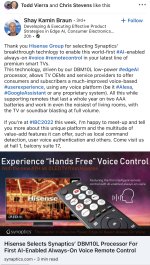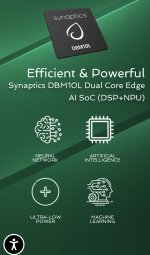Hi
@Diogenese
Me, myself and I along with my Blind Freddie believe that the AKIDA with LSTM IP has been in the hands of a select group of customers for some many months.
To come to this belief we have relied upon our deep scientific and technical knowledge amounting to zero and the following forensic known facts:
1. In June, 2019 Brainchip informed shareholder’s that AKIDA IP had been provided to a select group of early access customers - a large number of speculative dots now point to Valeo and Mercedes Benz being two of those customers.
2. It was not until 12 months later that Socionext received back the AKD1000 engineering samples from TSMC.
3. In November, 2021 Peter van der Made mentioned that the next version of AKD1000 with LSTM was shortly to be released to Engineering - Anil Mankar
4. At the AGM in May, 2022 the CEO Sean Hehir stated that he expected to be announcing the release of the IP in the second half 2022 and that if they decide to go to fab it would be first half 2023.
5. Peter van der Made has not been confined to Perth but has in recent weeks been helping out in the Paris offices with software and the US Offices with engineering both activities would seem unlikely if the AKIDA LSTM IP was still languishing incomplete on the bench in Perth. I note Paris is in Europe and Mercedes Benz and Valeo are there as well.
Now you may say I’m a dreamer but I am not the only one but I hope one day you will join us (Blind Freddie & me) and this idea will be as one.
My opinion only DYOR
FF
AKIDA BALLISTA





